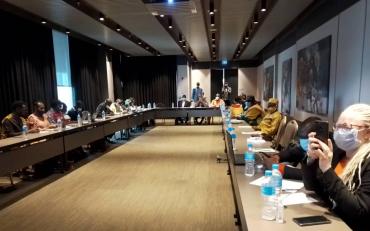November 5, 2020, Niamey
On November 4th and 5th, 2020, the West Africa Federation of Organisations of Persons with Disabilities (WAFOD), the African Disability Forum (ADF) and the International Disability Alliance (IDA) are holding the Regional Workshop in West Africa countries on Disability Inclusive Social Protection Response to COVID-19 Crisis: a new path towards inclusion. This workshop is held in partnership with the United Nations Partnership on the Rights of Persons with Disabilities (UNPRPD), the International Labour Organization (ILO) and UNICEF, with the support from the Norwegian Agency for Development Cooperation (NORAD).
DPOs from 11 African countries, mainly from West Africa - Benin, Burkina Faso, Ivory Coast, Ghana, Guinea-Conakry, Mali, Niger, Nigeria, Senegal, South Africa and Togo - come together to share their knowledge, skills, and expertise as well as to develop a common DPO-led understanding on social protection inclusive of persons with disabilities.
The workshop was opened by Idriss Maiga, President of the WAFOD and of ADF, who highlighted that “Persons with disabilities in the world are estimated at more than one billion, or about 15% of the world's population. The obstacles they regularly faced are mainly related to accessibility, discrimination and lack of support which hamper their participation in social, economic and political life on an equal basis with others. The COVID-19 pandemic and its socio-economic consequences have further accentuated these inequalities that persons with disabilities face.”
“COVID 19 crisis has highlighted the limits of social protection systems of many sub-Saharan Africa especially for the general population and for persons with disabilities and other vulnerable groups, in particular,” declared Alex Cote consultant of the UNPRDP-ILO-UNICEF inclusive social protection program.
Since COVID-19, people with disabilities are facing even tougher challenges than in regular times. They are exposed in many ways to the crisis due to the lack of inclusive response. One of these critical responses is the social protection schemes that, at any point in time, are critical for several persons, including those with disabilities, as it plays a significant role in facilitating access to support services, education, income support and economic empowerment as well as to rehabilitation and assistive devices, across the life cycle. Moreover, social protection could be a crucial vector of relief during COVID-19 pandemic and any future crisis.
“Many countries have some form of support through either limited concessions (often benefiting mostly formal economy workers and civil servants), household poverty assistance schemes with having a member with a disability as one of the targeting criteria, or limited coverage of health care costs. However, to date, few countries have taken steps to develop a meaningful and context-relevant combination of individual cash transfer, concessions, and services that would support children, working-age adults, and older persons with disabilities in line with the CRPD”, conclude Cote.
At the end of the day, the workshop aims to share experiences of social protection measures taken by different countries in the region in response to COVID-19, evaluate existing social protection measures that include persons with disabilities, explore how social protection and other initiatives aimed at mitigating the economic impact of the pandemic should include persons with disabilities, with recommendations for actions to include disability in the design and implementation of eligibility criteria and application procedures and their suitability. And Finally, explore messages and advocacy approach regarding the inclusion of persons with disabilities in COVID-19 relief and recovery measures that DPOs can use at different levels: regional and national.
In the closing remarks, Alex Cote declared that “the workshop co-organized by the AFD, WAFOD, IDA, and the UNPRPD-ILO-UNICEF inclusive social protection program was a great opportunity for DPOs leaders of the region to exchange about their country systems and identify inspiring practices that could be combined to build national systems to support the empowerment of persons with disabilities in Africa.” Ayassou Germain, ADF Board member closed the conference exhorting its success and high-level discussions and highlighting that “both WAFOD, ADF and IDA will push the conversation on social protection forward by producing a regional report, and promoting further exchanges with governments, UN agencies and regional representations of the European Union, as well as with the African Union”.
A comprehensive report of the workshop is being produced and will be shared soon at IDA’s networks.

